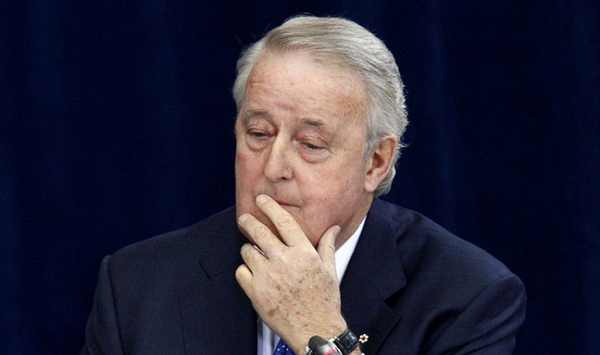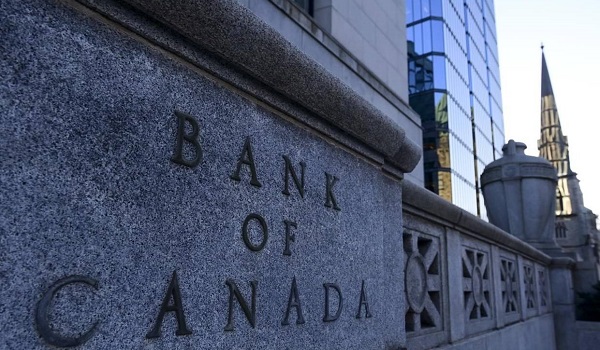Canada without Brian Mulroney will be difficult to imagine
Brian Mulroney is gone and it’s hard to imagine Canada without him in it.
It wasn’t that long ago he was his larger than live self at an event where he showered Prime Minister Justin Trudeau with praise.
Forget about the “trivia and the trash,” said Mulroney, who was doing the introduction for Trudeau at the Atlantic Economic Forum in Antigonish, N.S. Prime ministers, he said, are judged by “big ticket” achievements.
“First, the pandemic, the greatest challenge than any prime minister has happened to deal with for Canada in 156 years,” Mulroney said.
“Everybody says that our prime minister and our premiers conducted themselves as well as anybody else around the world.”
But that wasn’t all: “How about the renegotiation of NAFTA with Donald Trump?,” he asked. Mulroney recalled how he had negotiated free trade agreements with presidents Ronald Reagan and George Bush. Trump, however, was another matter altogether. Watching Trudeau deal with Trump, said Mulroney, who was an adviser to the Trudeau cabinet at the time, showed him this prime minister’s “‘vision” and “steady hand.”
It was typical Mulroney — simultaneously gracious, also a bit over the top, and fixated on the subject of prime ministerial legacies amid a hostile public opinion environment, just as he was for much of his time in office from 1984 to 1993.


Those were tumultuous times in Canada, replete with two constitutional showdowns, as well as the highly controversial Free Trade Agreement with the U.S. and the introduction of the goods and services tax.
Mulroney’s words of assurance for Trudeau, in fact, were an echo of what he wrote about himself in his massive, nearly 1,100-page memoir, released in 2007.
“I took steps to provide Canada with tough medicine — a course I thought was both wise and very much required. Was I right on the major issues? No one can be sure, but I believe history, both in the shorter and longer term, will indicate our actions were beneficial for Canada,” he wrote.
“I actually did govern not for good headlines in 10 days but for a better Canada in 10 years. I paid the price in media hostility and public disapproval. But I did so knowingly and willingly.”
Mulroney was in many ways correct. His legacy was controversial, to be sure, but enduring too. Free trade is now the fuel of the Canadian economy — something Trudeau did indeed have to protect from Trump’s existential and economic threats. The goods and services tax is certainly not beloved, but it is a major contributor to government coffers, and helps fund progressive programs.
And it bears mention too that the political backlash to the Mulroney years — the rise of the Bloc Québécois and the Reform Party; the shattering of the progressive conservative coalition, would prove consequential for decades to come. The Conservative party today is nothing like the one that Mulroney brought to two definitive majority wins in 1984 and 1988; it disappeared, essentially, when it was reduced to two seats after Mulroney’s departure from office in 1993.
One of his early trademark phrases in politics was about Canada as a country of “small towns and big dreams.” That was also the life story for Martin Brian Mulroney, an electrician’s son from Baie Comeau, who would end up as a leading figure on the world stage, singing for President Ronald Reagan (and doing his eulogy years later;) a confidante and friend to iconic British Prime Minister Margaret Thatcher. A networker extraordinaire, Mulroney would spend hours on the phone, often late into the night, keeping the relationship lines open with old friends and new ones, all over the world. Just last summer, Deputy Prime Minister Chrystia Freeland told me of chatting on the phone the night before with Mulroney, and trading observations about the state of American politics.
Whatever else could be said about the Mulroney years, they were never dull. To be a journalist covering Mulroney in his years in power as I did, was to brace every morning for the prime minister to say something large, dramatic, sometimes even fateful. Watching him long enough, you could almost see the clip coming. There he would be, speaking in that sonorous bass voice, tossing around million-dollar words, and suddenly you’d see the twinkle in his eye; the crease on his forehead disappear.
Sometimes it worked. “You had an option, sir,” he declared in the great 1984 TV debate with Liberal leader John Turner. Sometimes it didn’t, such as when he declared in the Commons in 1989 that the Constitution was “not worth the paper it was printed on.”
Perhaps that’s what made Mulroney so much of a lightning rod throughout much of his time in office. He could get tripped up in his own grand language and even grander ambitions. It was an exhilarating and exhausting time.
It was actually through covering Mulroney that I learned a fundamental truth of Canadian politics, which every prime minister learns — your friends can be more trouble to you than your enemies.

This reality punctuated Mulroney’s record, during and even after leaving office. A 1990 blow-up with his long-time friend Lucien Bouchard, who had been recruited to serve in Mulroney’s cabinet, led to the creation of the Bloc Québécois and a too-close brush with Quebec separation in the 1995 referendum. In more recent years, Mulroney’s relationship with German businessman Karl-Heinz Schreiber became the focus of a public inquiry that shone new, unflattering light on what was known as the Airbus saga in the early 1990s. Perpetually, it seemed, Mulroney’s troubles were generated by those he held too close to him.
In his first years in office, Mulroney had to contend with a highly aggressive Liberal opposition, featuring a band of maverick MPs dubbing themselves the “Rat Pack,” on a mission to bring down cabinet ministers. Five of Mulroney’s ministers were forced to resign during the first two years of his government — a total that has never been matched since.
Then came the Meech Lake constitutional accord, a 1987 deal Mulroney hammered out with all provinces to make Quebec a signatory to the Constitution. That deal would slowly start to unravel over the next three years, despite Mulroney’s most vigorous efforts to save it. (Bouchard’s explosive resignation was caused by what Mulroney was doing to rescue Meech.)
I had a small, walk-on part in that drama as part of a team of reporters who interviewed Mulroney after a frantic week of first ministers’ negotiations to save Meech in June, 1990. Asked whether he had left things too late or done too little, Mulroney boasted that the eleventh-hour desperation was all part of a plan — to “roll the dice.”
This article was reported by The Star









